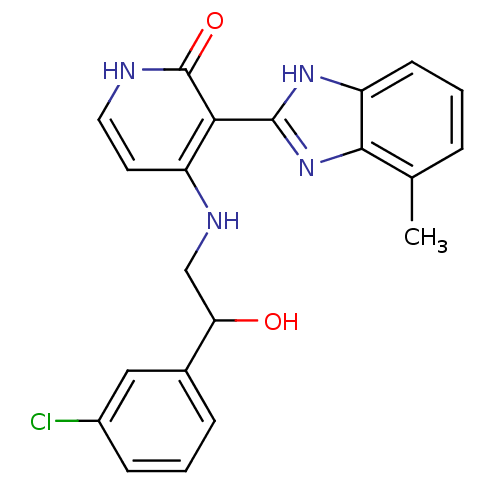null
SMILES Cc1cccc2[nH]c(nc12)-c1c(NCC(O)c2cccc(Cl)c2)cc[nH]c1=O
InChI Key InChIKey=LOYHRPQPVDZCBA-UHFFFAOYSA-N
Activity Spreadsheet -- Enzyme Inhibition Constant Data from BindingDB
 Found 4 hits for monomerid = 50209378
Found 4 hits for monomerid = 50209378
TargetCytochrome P450 1A2(Homo sapiens (Human))
Bristol-Myers Squibb Pharmaceutical Research Institute
Curated by ChEMBL
Bristol-Myers Squibb Pharmaceutical Research Institute
Curated by ChEMBL
Affinity DataIC50: 380nMAssay Description:Inhibition of CYP1A2 in microsomesMore data for this Ligand-Target Pair
TargetCytochrome P450 3A4(Homo sapiens (Human))
Bristol-Myers Squibb Pharmaceutical Research Institute
Curated by ChEMBL
Bristol-Myers Squibb Pharmaceutical Research Institute
Curated by ChEMBL
Affinity DataIC50: 710nMAssay Description:Inhibition of CYP3A4 in microsomesMore data for this Ligand-Target Pair
TargetCytochrome P450 2C9(Homo sapiens (Human))
Bristol-Myers Squibb Pharmaceutical Research Institute
Curated by ChEMBL
Bristol-Myers Squibb Pharmaceutical Research Institute
Curated by ChEMBL
Affinity DataIC50: 1.50E+3nMAssay Description:Inhibition of CYP2C9 in microsomesMore data for this Ligand-Target Pair
TargetInsulin-like growth factor 1 receptor(Homo sapiens (Human))
Bristol-Myers Squibb Pharmaceutical Research Institute
Curated by ChEMBL
Bristol-Myers Squibb Pharmaceutical Research Institute
Curated by ChEMBL
Affinity DataIC50: 770nMAssay Description:Inhibition of human IGF1R expressed in recombinant insect cellsMore data for this Ligand-Target Pair
